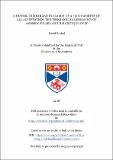Files in this item
A pastor-theologian in search of a faith worthy of all acceptation : the theological genealogy of Andrew Fuller and his critique of it
Item metadata
| dc.contributor.advisor | Holmes, Stephen R. | |
| dc.contributor.author | Rathel, David Mark | |
| dc.coverage.spatial | [7], 177 p. | en_US |
| dc.date.accessioned | 2019-06-05T15:50:04Z | |
| dc.date.available | 2019-06-05T15:50:04Z | |
| dc.date.issued | 2019-06-25 | |
| dc.identifier.uri | https://hdl.handle.net/10023/17824 | |
| dc.description.abstract | The eighteenth-century Particular Baptist minister Andrew Fuller lived a consequential life. He assisted in forming the Baptist Missionary Society, the first modern Protestant missions society. His published theological tracts, particularly his works on soteriology, left an indelible mark on Baptist and even evangelical life. Fuller remains most famous for rebutting a form of Calvinism described as hyper- Calvinism or false Calvinism in the relevant literature. This theological tradition sought to maximize divine grace by minimizing human participation in salvation’s reception. To downplay human action, hyper-Calvinist ministers denied both the legitimacy of free offers of the Gospel and a universal duty to respond to the Gospel. Despite Fuller’s significance, existing scholarly accounts of his life present deficient readings of the hyper-Calvinist theology that he rejected. They either fail to explore the primary source material closely, or they rely on incorrect assumptions about hyper- Calvinism’s development. This fact has led to incomplete portrayals of Fuller’s biography. Contemporary scholars are unable to discern accurately the concerns that animated Fuller, the particular ministers that he sought to engage, and even the sources on which he relied. In this thesis, I provide a more nuanced reading of the hyper-Calvinism relevant to Fuller’s setting to contextualize his response to that theology. I present hyper-Calvinism as a diverse movement—more diverse than the current literature portrays. Though hyper-Calvinist theologians shared the goal of diminishing human agency, they disagreed on approach; some preferred to present salvation as occurring pre-temporally in the covenantal arrangements of God while others chose to emphasize a human inability to believe the Gospel. I argue that this reading of hyper-Calvinism provides new insight into Fuller’s writings; in particular, it reveals that Fuller relied on the works of John Gill and publications composed by participants in the modern question debate more than scholars have realized. | en_US |
| dc.language.iso | en | en_US |
| dc.publisher | University of St Andrews | |
| dc.subject | Andrew Fuller | en_US |
| dc.subject | Particular Baptists | en_US |
| dc.subject | John Gill | en_US |
| dc.subject | Eighteenth-Century Evangelicalism | en_US |
| dc.subject | Soteriology | en_US |
| dc.subject | Gospel offer | en_US |
| dc.subject | Duty faith | en_US |
| dc.subject | Baptist history | en_US |
| dc.subject.lcc | BX6495.F75R2 | |
| dc.subject.lcsh | Fuller, Andrew, 1754-1815 | |
| dc.subject.lcsh | Baptists--Clergy--Biography | en |
| dc.subject.lcsh | Baptists--Great Britain--History--18th century | en |
| dc.subject.lcsh | Baptists--Doctrines--History--18th century | en |
| dc.title | A pastor-theologian in search of a faith worthy of all acceptation : the theological genealogy of Andrew Fuller and his critique of it | en_US |
| dc.type | Thesis | en_US |
| dc.type.qualificationlevel | Doctoral | en_US |
| dc.type.qualificationname | PhD Doctor of Philosophy | en_US |
| dc.publisher.institution | The University of St Andrews | en_US |
| dc.identifier.doi | https://doi.org/10.17630/10023-17824 |
This item appears in the following Collection(s)
Items in the St Andrews Research Repository are protected by copyright, with all rights reserved, unless otherwise indicated.

